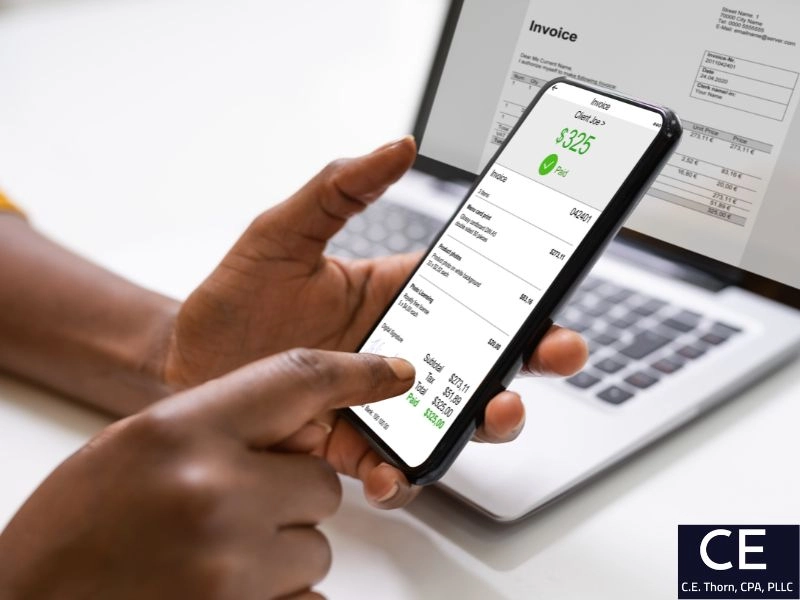
Is Work-Related Ridesharing a Tax Deductible Expense?
Ridesharing is part of daily life now, but the tax rules aren’t always intuitive—especially when you’re asking, "Can you can write off Lyft rides on your taxes?" In general, rides taken for true business purposes may be deductible, while everyday commuting to your regular workplace is typically not.
Join the Raleigh CPAs at C.E. Thorn, CPA, PLLC, as we explore scenarios when rides may qualify as work-related travel expenses and how to keep accurate records so you can claim eligible deductions during your yearly tax filing. We'll address the question: Can you write off Lyft rides on your taxes as a business professional. We'll explore when rideshare services, like Lyft and Uber, are tax deductible and how you can claim a deduction.
Table of Contents
What Is Considered Work-Related Travel?
Before we can answer, "Can you write off Lyft rides on your taxes?," we need to explore what is and is not considered work-related travel.

The term “work-related travel” refers to any travel made for the purpose of work that is outside of the normal commute to and from the office. For instance, a regular day driving to your normal location of employment does not qualify as work-related travel. In contrast, if you are scheduled for an out-of-town conference or a seminar that exceeds the distance of your normal commute, those events may be classified as work-related travel and qualify as a tax deductible expense.
It's important to consult with a qualified and experienced Raleigh small business accountant to discuss your specific situation before filing rideshare company expenses for work as tax deductions.
When Is an Uber and Lyft Ride Tax-Deductible?
Can you write off Lyft rides on your taxes (or Uber, or another rideshare) when commuting to and from your place of work? In most cases, a ride from Uber or Lyft from home to your regular workplace is considered commuting and is not a deductible work expense. Rides connected to bona fide business purposes—like going from your office to a client site or airport for a business trip—may be deductible if properly documented. Let's explore some specific situations and whether or not they may be eligible for tax deductions.
Tax Deductible Business Travel and Work-Related Expenses
Can you write off Lyft rides on your taxes (or Uber, or another rideshare) if it is for a work-related expense? Transportation between business locations (not home) may be tax deductible. Examples that may qualify as work related travel expenses include:
- Rides from your office (or qualifying home office) to a client meeting, job site, vendor, or industry conference.
- Rides between multiple work locations on the same day.
- Rides to and from the airport or train station for a business trip.
- Rides at your destination city between hotel, client offices, and event venues.
- Rental cars, tolls, and parking fees incurred on a deductible business route.
- Hotel bookings.
- Baggage fees.
- 50% of the cost of meals related to travel.
- Tips related to eligible expense services.
If a ride serves both business and personal reasons, you can generally deduct only the portion that is business related.
Are Commuting Miles Tax Deductible?
Can you write off Lyft rides on your taxes if they are commuting miles? Let's explore.
Commuting and work-related travel are not the same things. When you commute to and from your normal place of work, this is a personal financial responsibility of yours and is therefore not tax-deductible. Your employer does not foot the bill for your normal car expenses, gas money, toll fees, or car maintenance costs. Nor does your employer pay for taxi fare, ridesharing expenses, bus, or train costs that are a part of your everyday, normal navigation to and from the workplace.

Unfortunately, “commuting” in any form is not a tax deductible expense. This includes ridesharing services such as Uber and Lyft.
Is Ridesharing for W-2 Employees Eligible for Tax Deductions?
For most W-2 employees, unreimbursed job expenses (including Uber or Lyft) are suspended for federal purposes through 2025. That means Lyft and Uber rides to work is generally not tax deductible for employees. A practical option to cover the cost of rideshare services may be to request reimbursement under your employer’s accountable plan. This can allow tax-free reimbursement when the expense is business related and substantiated, but its up to the discretion of your employer to cover this expense or not.
Can Self-Employed Workers be Reimbursed for Travel?
If you’re self-employed or an independent contractor, necessary and ordinary business expenses—like rides between business locations—may be deductible on Schedule C. Proper records help ensure the deduction reduces net income, which in turn can affect quarterly estimated income taxes. Be sure to keep your ride receipts, dates, business purpose, start/end locations, and any toll or parking fee information to discuss eligibility with your accountant come tax filing time.
Special Situations for Writing Off Lyft and Uber Expenses
Some scenarios fall into gray areas where Lyft and Uber expenses may be deductible, but only with the right facts and documentation:
- Mixed-Purpose Trips: If a ride includes business and personal stops, you generally deduct expenses related only to the business portion. A clear, detailed log can help.
- From Home to a Client: If you have a qualifying home office that is your principal place of business, rides from home to a client or second work location may be treated as business travel rather than commuting. Qualifying status is fact-specific and should be reviewed.
- Temporary Work Locations: Travel to a temporary work location (generally expected to last one year or less) may be treated as business transportation rather than commuting. Consider documenting why the site is temporary.
- Safety, Late-Night, or Inclement Weather: Even when prudent, a late-night Uber home from the office is usually still commuting. An employer reimbursement policy may be the better route.
Qualified Deductions for Lyft and Uber Drivers
While we are focusing on passanger expenses for rideshares, here are some key points to note if you are a rideshare driver, as your deductions look different:
- You may choose the mileage deduction (covering business miles at the IRS standard rate) or actual vehicle expenses (gas, repairs, insurance, vehicle depreciation, etc.).
- Track fees and commissions retained by the rideshare company (Uber/Lyft).
- Keep detailed records for miles, receipts, and payouts.
- Your deductions reduce self-employment income, which affects both income tax and self-employment tax.

How to Track Lyft Rides and Other Work-Related Travel Expenses
Good financial records help you substantiate deductions and simplify tax time. Be sure to:

- Save receipts for each ride (in-app PDFs work).
- Note the business purpose, date, and locations.
- Keep a calendar of meetings/trips to align with receipts.
- Separate personal and business payments where possible.
- For Uber and Lyft expenses, consider a dedicated business card or app-based expense tool.
- If you’re self-employed, review how these costs interact with other travel expenses (airfare, rental car, lodging, meals).
Simplify Work-Related Travel Expense Deductions
The most important thing you can do when it comes to work-related travel expenses is to save all the receipts for travel, lodging, meals, conference or training costs, or any other expense that relates to your business or professional development.
Working with a CPA who offers bookkeeping services and can will review your financial statements and documentation related to work-related travel expenses is the best way to ensure that you are complying with the ethical standards of the IRS. Our Raleigh accountants at C.E. Thorn, CPA, PLLC recommend keeping a detailed log of any work-related travel you utilize, whether it’s Lyft, Uber, or another rideshare company. This is because you need documentation stating your business purpose, destination, cost of the ride, any tips included, when filing travel related tax deductions.

Contact a Raleigh Tax Professional Today
Can you write off Lyft rides on your taxes? Possibly, but to get a concrete answer to that question, consult a tax preparation CPA in Raleigh to have your travel records reviewed. At C.E. Thorn, CPA, PLLC, we help small businesses owners across Raleigh and the Greater Triangle plan, file, and pay taxes related to business expenses.
To see if our CPA firm is a good fit for your accounting needs, call us today 919-420-0092 or fill out the contact form below.
